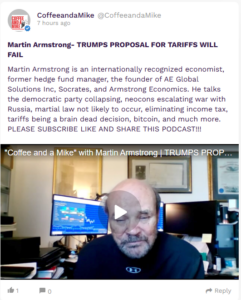Understanding the Economic Landscape: Lessons from History and a Call for Action
The world often presents itself as a paradox. Are we truly living in a free society, or is that merely an illusion crafted by selective narratives? Recent interviews revealing the strained relationship between political figures, media narratives, and international relations raise serious questions about the integrity of our information environment. Here at Extreme Investor Network, we delve into these complexities, encouraging thoughtful discourse around economics and global affairs.
A Glimpse into Current Affairs
Our attention is drawn to significant geopolitical tensions, highlighted by communications from various ambassadors. For example, the Russian ambassador’s comments underline a troubling hypocrisy in media representation—while leaders like Zelensky receive unprecedented attention, counterparts from other nations face constant demonization. This dynamic leads to disillusionment among youths, who are often mobilized for causes without a comprehensive understanding of the global landscape.
As a community invested in financial education and responsible investing, we at Extreme Investor Network recognize the importance of informed activism. It begins with understanding the underlying economic principles driving these narratives rather than merely reacting to them.
The Call for Transparency and Vigilance
In this sphere, truth can be a dangerous commodity. Visionaries and economists like Martin Armstrong highlight the peril of ignoring history’s lessons. With a commitment to maintain his independence, Armstrong’s analysis offers a unique perspective on the economic philosophies that could catapult us toward another Great Depression—a lesson many seem eager to forget in the face of short-term political gains.
Armstrong reflects on recent communications surrounding tariffs proposed by former President Trump. He warns that these measures could mirror the disastrous Smoot-Hawley Tariff Act of 1930, which contributed to the economic downturn that gripped the world during the Great Depression. Such historical references are essential for us to consider the possible repercussions of current economic policy discussions.
Bridging History to the Here and Now
As we navigate today’s tumultuous economic terrain, it’s essential to recognize the interconnectedness of global economies. The lesson here is clear: economic isolationism, whether through tariffs or sanctions, can lead to severe long-term consequences. Instead, history teaches us that cooperative trade frameworks foster economic resilience—essentially, a symbiotic relationship between nations is vital for stability.
At Extreme Investor Network, we advocate for proactive engagement over reactionary measures, promoting free trade as a pillar of global economic health. By encouraging dialogues and insights that circumvent traditional mainstream narratives, we empower our readers to see beyond the immediate headlines.
The Road Ahead: Embracing Independent Insight
Navigating the economic waters of the 21st century requires vigilance, transparency, and an unwavering commitment to historical context. As we forge ahead, we must be wary of the advisors steering policy decisions without the wisdom gleaned from experience. Here, we echo Armstrong when he underscores the importance of eliminating taxation that drives businesses offshore.
To reinvigorate our economy, we must consider radical rethinking—like eliminating income tax to foster domestic growth. In doing so, we may not only address the trade deficit but also support a broader economic renaissance that won’t just benefit one sector but resonate through our entire economic structure.
A Call to Action
As we reflect on these ideas at Extreme Investor Network, we invite our readers to participate in this dialogue. By engaging with us, joining discussions, and sharing insights, you can be part of the movement that champions an informed and educated approach to investing and understanding economic policies.
Let us commit to a more profound exploration of the economic phenomena shaping our world. Together, we can ensure that we not only learn from history but also empower our futures. Remember, the more informed you are, the better equipped you’ll be to navigate the complexities of global economics.
Finally, let’s not forget that good food and company—like a hearty Thanksgiving turkey dinner and pumpkin pie—might just be the propeller we need for self-care amid the economic whirlwind. Here’s to finding balance and nurturing both our minds and our appetites in this journey toward financial enlightenment.

